Full script:
AYN RAND TAKES A STAND
by David Hare
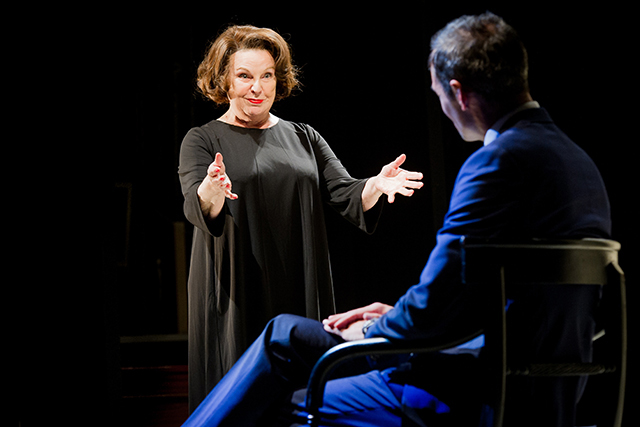
Ann Mitchell as Ayn Rand and Steve John Shepherd as Gideon. Photo by Robert Workman.
Ayn Rand Takes A Stand was commissioned as part of A View From Islington North, a show comprising short political satires which ran at the Arts Theatre in the West End from 18 May to 2 July 2016. David Hare’s contribution finds stark contradictions at the heart of conservative politics, brought alive in an imaginary encounter between the late arch-capitalist philosopher and novelist Ayn Rand, and two prominent Tory politicians – one of whom is now our prime minister. Ayn Rand Takes A Stand was first performed on 18 May 2016.
AYN RAND TAKES A STAND
by David Hare
AYN RAND is in her fifties, a formidable spectre with a severe haircut and a strongly Russian-sounding American accent. She chain-smokes. GIDEON is in his forties, English, tightly suited, fastidious. She is pacing, he is seated in what looks like the cement basement of a large building. Behind them is a steel door.
AYN: So, Gideon, I sell you an orange, right?
GIDEON: Right.
AYN: I sell you an orange.
GIDEON: Good.
AYN: How is the price of the orange decided?
GIDEON: We decide the price together.
AYN: How do we do that?
(GIDEON hazards a guess)
GIDEON: We bargain?
AYN: Correct.
GIDEON: We bargain.
AYN: Correct. Factors come into play. It may be a question of how badly you need the orange or how badly I need to sell it. OK, let’s say I sell it. I’m the seller and maybe I sell it dear. For more than it’s worth. Or another way of putting it, you’re the buyer and stupidly you pay too much. But you’re only do that once, am I right?
GIDEON: You’re right.
AYN: Because you’re an intelligent person.
GIDEON: Of course you’re right.
AYN: But even if you weren’t it doesn’t matter. Because this is the point: nobody makes the same mistake twice.
GIDEON: Nobody.
AYN: You eat the orange, it’s not good, it’s dry, it’s eeugh, it’s not worth the money you paid. So you’ll never pay that price again.
GIDEON: Never.
AYN: You’ve learnt your lesson.
GIDEON: I have.
AYN: And it’s painful. It’s extremely painful. But look at it the other way round. This is the interesting bit. I’m the seller, and what’s happened? Long-term. I’ve lost a customer. Why? Because I charged too much. I treated you like a sucker. What do you say in English? “Once bitten, twice shy.”
GIDEON: We do say that.
AYN: I’ve made a bad bargain. Bad because it doesn’t work for you and ultimately it doesn’t work for me.
(AYN laughs heartily)
AYN: Because the one thing we know about markets, the reason we love markets, is that they’re educational. You make a mistake, you suffer. That’s what I call educational.
GIDEON: Me too.
AYN: And so there it is, pure and simple in its beauty, Gideon. The beauty of the market. It’s where you learn. Everyone is educated at their own expense. “Oh God, I should never have brought that orange.” And “Oh God, I should never have over-charged.” Don’t you love markets?
GIDEON: I do. I do love markets.
(AYN laughs again, as if it’s all hilarious)
AYN: And so there’s only one thing, Gideon, only one phenomenon which can distort a market, which can turn a good clean market into a filthy bordello, and we both know what that is, don’t we?
GIDEON: I think we do.
AYN: You’re right to look uncomfortable –
GIDEON: It’s just my chair –
AYN: I don’t think so –
GIDEON: I was skiing at the weekend, so –
AYN: Only one thing can spoil a pure market, and that’s what we call a third party, a third party with no interest in the outcome. And the word for that is what? The word for that third party is –
(GIDEON hesitates, the nervous pupil)
GIDEON: A government?
AYN: Right answer. Good. You’re getting the hang of this.
GIDEON: Thank you.
AYN: You’re learning.
GIDEON: Thank you.
AYN: Now I bet you’re glad you asked to see me.
GIDEON: I’m joyful.
AYN: Yes, it’s a government, isn’t it?
GIDEON: It certainly is.
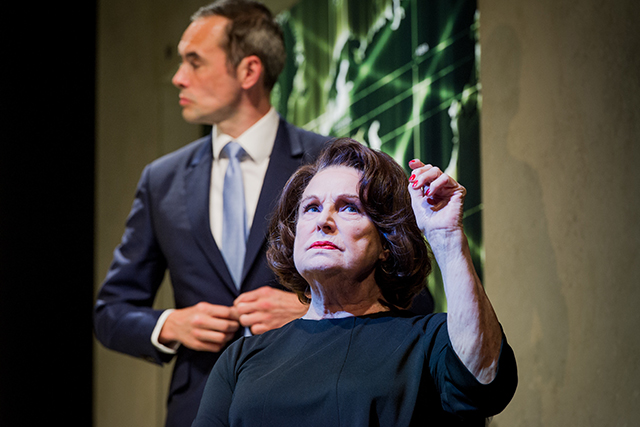
AYN: Government arrives, usually in the form of the regulator. I don’t call them regulators, I call them inhibitors, because they inhibit prosperity. They come with rules – oranges must be sold at a certain price, oranges must be perfectly spherical, oranges must be harvested by workers on the national minimum wage, only three oranges may be sold at any one time and only by people who are – I don’t know – left-handed – or with a history of violent mental disorder – suddenly there are rules, and because these rules are dreamt up by people who have no personal interest in the outcome of individual transactions, people with nothing invested in those transactions, these rules fuck up the beauty of the market. They shit on it.
(GIDEON frowns)
GIDEON: That’s how you see government?
AYN: Not just government. Any third party.
GIDEON: Any?
AYN: Of any kind. Any party not essential to the deal. How do we learn? How do we learn unless we make our own mistakes? Free from interference and free from control.
(AYN sits back)
AYN: Oh my God, Gideon, can you see another world? A world in which human beings were allowed to be great? If only we were free.
(GIDEON shifts on his chair)
AYN: You’re looking uncomfortable.
GIDEON: A little.
AYN: Why?
GIDEON: This is what’s bothering me.
AYN: Say.
GIDEON: ‘Free.’ It’s a funny word, isn’t it?
AYN: Funny?
GIDEON: Yes. We’ve been having some trouble with it.
AYN: We? Who is this we’?
GIDEON: Meaning me and my friends. My colleagues. The people I work with.
AYN: I don’t like this word ‘we’. I don’t use it. I lived in Russia, remember?
GIDEON: What do you use instead?
AYN: ‘I’. I use ‘I’. People fought and died to claim that word ‘I’. So let’s honour their memory. Please.
(GIDEON takes this in)
GIDEON: OK. I’ll re-phrase. The word ‘free’, I’ve been having some trouble with it lately.
AYN: Tell me what sort of trouble.
GIDEON: I can’t quite get it to mean what I want.
(AYN frowns, unsure)
AYN: Go on.
GIDEON: Well if you take the ways people use it, say, like the ‘free world’, for instance, obviously that’s good, everyone likes the free world – or ‘free will’, say, that’s good too –
AYN: I love free will.
GIDEON: Me too.
AYN: I base my life on it. Doing what I want and that’s my right.
GIDEON: ‘Free market’ – that’s another good one, obviously –
AYN: ‘Free market’s’ very good, it’s more than good, it’s life itself.
GIDEON: Those are good, of course those are good, those are good things –
AYN: ‘Free love’ –
GIDEON: Yes, well, I’m not sure about that one –
AYN: Who is?
(AYN laughs again, extravagant, arms waving)
AYN: Oy oy oy. Don’t ask. All I’ll say: I’ve lived a life. Trust me. You don’t want to know.
GIDEON: No. But then – look, I’ll be honest with you: ‘free lunch’, now free lunch, that’s very definitely not good.
AYN: No.
GIDEON: That’s not good at all.
AYN: There is no such thing.
GIDEON: There is no such thing as a free lunch.
AYN: You said it.
GIDEON: Health care free at the point of delivery, free at the point of need – that’s not good either.
AYN: You have that in your country?
GIDEON: We used to.
AYN: Free health care?
GIDEON: Yes. But now we can’t afford it.
AYN: Are you crazy? Why? Why did you have that?
GIDEON: It’s a tradition.
AYN: Oh Jesus, here we go. What’s wrong with you people? Tradition! Forget tradition! What’s wrong with you?
(AYN gets up, furious. She stamps out her cigarette, grinding it with her heel)
AYN: How many times do I have to say? Give people something free and they don’t value it. Why is no-one listening?
(AYN shakes her head at the stupidity of it)
AYN: Gideon, it’s an uphill struggle. You know that…
GIDEON: I know that.
AYN: Man is born free and everywhere he is in chains. Only markets set them free. That’s why I chose to be a novelist. I chose.
GIDEON: Oh a great novelist –
AYN: You’ve read my novels?
GIDEON: Please. I’d hardly be here if I hadn’t. Atlas Shrugged.
AYN: That was a good one.
GIDEON: Better still, The Fountainhead.
AYN: I didn’t know if it was my novels –
GIDEON: Both –
AYN: – or my ideas –
GIDEON: They’re inseparable, aren’t they?
AYN: I think so. I tell stories. Virile stories. About virile people. Towering people who thrive in the market.
(GIDEON shifts, again)
GIDEON: Yes, don’t get me wrong, I’m a fan –
AYN: I’m glad to hear it.
GIDEON: Quite. But sometimes in the daily struggle of my work I have doubts.
AYN: Doubts?
GIDEON: Yes. I lie awake. There seem to be contradictions I can’t resolve. I’m confused.
AYN: Is that why you changed your name?
GIDEON: How do you know about that?
AYN: I know.
GIDEON: How do you know?
(AYN looks at him, pitiless)
AYN: Because you’re not Gideon, are you?
(The door is violently wrenched open. THERESA is standing, angry. She is a blonde, fierce woman in her fifties)
THERESA: And so I’ve got to waste my time – my time – listening to theory. You want to discuss theory, when I want to act.
GIDEON: Theresa –
THERESA: I don’t want to talk, I want to act. Of course in your world, you don’t do anything. You just lounge around with young men in moleskin trousers chatting. But my world’s different.
(GIDEON smiles, polite)
GIDEON: Theresa, you haven’t met Ayn?
THERESA: I haven’t had that pleasure.
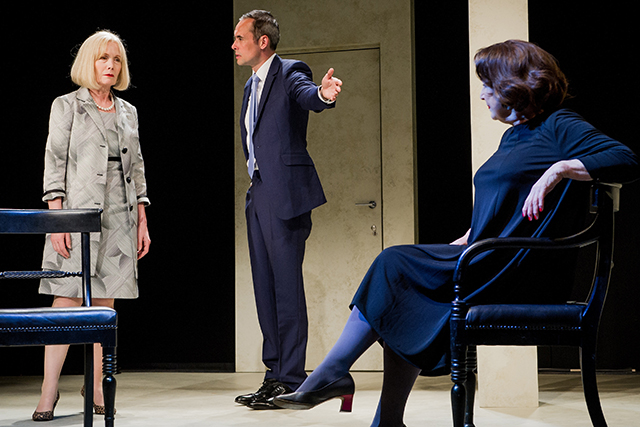
Jane Wymark as Theresa, Steve John Shepherd as Gideon and Ann Mitchell as Ayn. Photo by Robert Workman
AYN: Theresa.
THERESA: Ayn.
GIDEON: I wanted you to meet Ayn for all sorts of reasons, not least because she’s a commanding novelist.
THERESA: You wanted me to meet a novelist?
GIDEON: Yes.
THERESA: I’ve stayed away from novelists.
AYN: Me too.
THERESA: All my life.
GIDEON: Ayn’s different, she’s more of a philosopher-novelist –
THERESA: Even worse. Do you have any idea how busy I am?
(AYN smiles)
AYN: Humour me, just for a moment, will you, Theresa? I’m told you’re a very intelligent woman –
THERESA: You’d better not doubt it.
AYN: Then you should be able to help us discuss ideas of freedom.
THERESA: Freedom? I believe in it with every sinew of my frame.
(GIDEON shifts)
GIDEON: But that’s not quite true, is it, Theresa?
THERESA: Not true?
GIDEON: You’re not telling Ayn the whole truth.
THERESA: Look, if you’re just here to make arguments –
AYN: That’s exactly what we’re here for.
THERESA: I believe in freedom.
GIDEON: But not in freedom of speech?
THERESA: Freedom of speech?
GIDEON: Yes.
THERESA: I support it robustly. It’s the democratic way.
GIDEON: You support it robustly except when you don’t.
THERESA: Unfair.
GIDEON: Please. Tell Ayn Rand.
(THERESA pauses a moment, considering)
THERESA: What can I say? Freedom of speech is no different from any other. It mustn’t be abused. You abuse it, you lose it. For instance, it must never be deployed to give comfort to our enemies –
GIDEON: Which enemies are those?
THERESA: We have so many.
GIDEON: How many?
THERESA: I get an update every morning. It’s on my desk before seven.
GIDEON: What enemies?
THERESA: All around us, everywhere. Some born in our own country, in the sickly interstices of our inner cities. We have to take precautions. The incitement of hatred is forbidden. The propagation of non-British values is forbidden.
AYN: But those British values include free speech, don’t they?
THERESA: Of course. Yes.
(THERESA frowns)
THERESA: So. What’s your question?
AYN: I’d have thought it was obvious.
THERESA: Not to me.
AYN: Put it like this: in order to defend free speech, you’re shutting it down?
THERESA: If you want to put it that way.
AYN: How else would you put it?
THERESA: That’s your business.
AYN: You don’t see it as a problem?
THERESA: No. Do you? We don’t live in Utopia. There are bad people out there.
AYN: What makes you say people are bad?
THERESA: There’s a balance, isn’t there, between freedom and security? I favour security.
AYN: You mean against violent extremists?
THERESA: Yes. But not exclusively.
AYN: Who else?
THERESA: Non-violent extremists. People with incendiary views.
AYN: Incendiary?
THERESA: Yes. Inflammatory. Subversive. Dissident.
AYN: Like mine, you mean?
THERESA: No, not like yours.
AYN: But anyone unconventional?
THERESA: Yes. I make no apology.
(AYN shrugs, QED)
AYN: Then Gideon’s right.
AYN: You don’t believe in free speech.
THERESA: Gideon? Who’s Gideon?
AYN: And who, pray, decides this balance? Between freedom of speech and security?
THERESA: I would thought that was obvious.
AYN: Tell us.
THERESA: Why, I do. And people like me. People of my stripe.
AYN: What position do you hold in your government?
THERESA: I’m Home Secretary.
AYN: I’m shocked.
(There is a silence while AYN takes this in)
THERESA: Remember in this country, we’re not citizens, we’re subjects.
AYN: Subjects of the crown?
THERESA: Correct. In the United Kingdom, I am happy to say freedom of speech is a privilege, not a right. By law, only those who can be trusted to use it properly can be trusted to have it in the first place.
AYN: By law?
THERESA: Oh yes, most certainly.
(GIDEON is shaking his head, his patience wearing thin)
GIDEON: You see what I’m dealing with?
AYN: I’m beginning to.
GIDEON: This is what I have to deal with every day! While I try and do my work.
(AYN turns, relishing the fight)
AYN: I admit, Theresa, I’m meeting you under a misapprehension. I was told you were a Conservative.
THERESA: I am a Conservative.
AYN: How is that possible? Conservatives disapprove of government interference –
THERESA: I am one such.
AYN: At the Home Office?
THERESA: We don’t interfere. We never interfere. We don’t read e-mails and we don’t tap phones.
AYN: I’m pleased to hear it.
THERESA: Except, of course, when the national interest is at stake. Then we do.
AYN: And who defines that interest?
THERESA: Do you need to ask?
(THERESA is unabashed)
THERESA: People are free to say what they like. As long as it doesn’t offend British values.
AYN: And what are those values?
THERESA: Extreme tolerance!
(THERESA has raised her voice. Now she turns)
THERESA: And while we’re at it, what exactly is this Gideon business, may I inquire? She calls you Gideon.
GIDEON: She does.
THERESA: Why?
GIDEON: Because believe it or not that is my real name.
THERESA: So you’re an imposter?
GIDEON: Not at all.
THERESA: Explain.
GIDEON: It was a teenage act of rebellion.
THERESA: Why?
GIDEON: I was sent to St Pauls. I was bullied. I was bullied for being called Gideon. The name was thought to be pretentious. I endured derision.
THERESA: So you changed?
GIDEON: I didn’t feel like a Gideon. If you read the novels of Ayn Rand, she makes it clear: you can be what you want to be. I wanted to be George Osborne. I wanted the freedom to be George Osborne, not to be trapped in being Gideon Osborne.
THERESA: And your daughter?
(He waits)
GIDEON: What about my daughter? Why bring my daughter into this?
THERESA: You named her Liberty.
AYN: Is that true?
GIDEON: Yes. I gave her that name.
AYN: Gideon, I like you more and more. I begin to desire you.
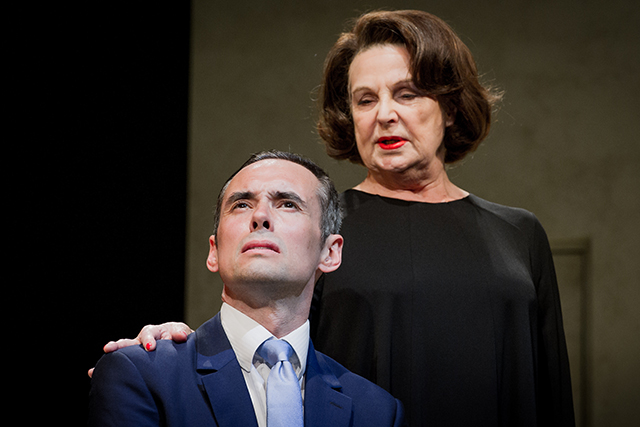
GIDEON: I’m heir to the baronetcy of Ballentaylor and Ballylemon. I wanted a child called Liberty and now I have one.
AYN: What a man!
(He stares, unapologetic. Then moves to the door)
GIDEON: And so please, let’s move to the heart of things.
AYN: To the heart, yes.
GIDEON: The reason why we’re here.
THERESA: I’m longing to know. Time’s going by.
GIDEON: I’m Chancellor of the Exchequer and everything I am, everything I love is invested in the idea of the free market.
AYN: As it should be.
GIDEON: I’ve summoned Ayn here to deal with my dilemma.
THERESA: Why are you locking the door?
(GIDEON locks the door and holds up the key)
GIDEON: Because I don’t want you leaving.
THERESA: Are you locking me in?
GIDEON: That’s exactly what I’m doing. I’m locking you in to ask you a question.
THERESA: I can’t get out without answering the question?
GIDEON: No.
THERESA: Then ask.
(GIDEON pauses for a moment. Then)
GIDEON: How can you have a free market without free movement of labour?
(THERESA looks at him in horror, then heads for the door)
THERESA: All right, enough! I know what this is about. I’m getting out of here!
GIDEON: You can’t. I forbid it.
THERESA: I’m not answering.
GIDEON: Why not?
THERESA: I’m not telling you.
GIDEON: You’re not answering because you can’t!
THERESA: I claim my right to leave.
GIDEON: You don’t have rights, you have privileges. I heard you say it, you said it! And your privileges have been withdrawn.
(THERESA is at the door, shaking it)
GIDEON: It won’t give way. It’s a steel door.
AYN: It’s human to waste time doing things which can never succeed. But as man evolves, he also learns. A steel door will never open without a key.
THERESA: Give me the key!
(THERESA turns, furious. GIDEON has slipped the key down his trouser)
THERESA: Give me the fucking key!
GIDEON: I’ve eaten it.
AYN: Now I’m beginning to understand why Gideon’s asked me here. Before you arrived I was selling Gideon an orange.
THERESA: His name isn’t Gideon. It’s George.
AYN: We were trading oranges in a free market. You know what I’m talking about?
THERESA: A free transaction. Pure. Without regulation. And therefore uncorrupted. An educational transaction. Both parties free and therefore free to learn.
AYN: Good.
THERESA: The stupid man is punished. The wise man rewarded. An ideal world.
AYN: You know your stuff.
THERESA: So?
(AYN smiles)
AYN: So imagine, just imagine this situation, across the road there’s another market and there the oranges are grown more cheaply.
THERESA: Well?
AYN: So what do you do then? We’re in a free market, aren’t we?
THERESA: I should hope so.
AYN: So shall we open our arms to invite these orange-sellers in? Or will we build a camp, Theresa, with steel wire and watchtowers, somewhere near Calais, say, to keep these orange-sellers out?
(GIDEON shrugs. He has sat down and now he speaks quietly)
GIDEON: No free movement of labour, no free market.
(AYN lights a cigarette, brought to life, winning an argument and loving it)
THERESA: This is wrong! I’m not listening to this!
AYN: Theresa I wonder if you ever think through the implications of your own actions.
THERESA: I’m not here to be lectured. I won’t be lectured!
AYN: Do you spend time examining yourself?
THERESA: Certainly not.
AYN: Do you have self-doubt?
THERESA: None.
AYN: I came from Russia and made my life in the great American market place. I prospered. How did I do that? By showing more courage, more initiative, more imagination, more flair than the people who were born in my adopted country.
THERESA: I don’t doubt that.
AYN: Why would I deny to a fresh generation of immigrants the opportunities I enjoyed myself? Here they are, the good people, full of aspiration, the people of Syria and Libya, the people who walked from Aleppo, willing to cross an open sea, at dead of night, huddled together in leaking boats, risking their lives, risking their children’s lives and all to sell oranges in the open market. What perfect examples of the capitalist initiative! What perfect capitalists! The embodiment of self-reliance. Should I stand at the market door with a machine-gun in hand, and say “Only those who are already in this market may trade in this market”. You want me to say that?
THERESA: No.
AYN: America took 187,00 Jews after the war. Britain took 60,000 Asians from Uganda. The borough you call Brent took 10,000.
(THERESA shakes her head, frustrated)
THERESA: It’s different.
AYN: Why? Why is it different?
THERESA: Things have changed.
AYN: Changed?
THERESA: Changed decisively. Suddenly.
AYN: Changed from when? Changed from when the French came?
THERESA: No!
AYN: Changed from when the Poles came? Changed from when the Jews came?
(THERESA moves away, angry)
THERESA: Don’t get smart with me.
AYN: I’m not being smart.
THERESA: Don’t try that Jew-thing.
AYN: Why not?
THERESA: Saying ‘Jew’ won’t make me feel guilty, so don’t think it will.
AYN: Why not?
THERESA: Because you know very well: it’s the numbers. The sheer weight of numbers.
AYN: Why is that different?
THERESA: And the threat to our culture.
AYN: What culture?
THERESA: The culture of being British.
AYN: And that culture, what is its essential nature? Is it an open culture?
THERESA: I think so. Yes. Subject to the usual provisos.
AYN: Is it an entrepreneurial culture?
THERESA: We want it to be, yes.
AYN: Why then, you must let them in. You must let everyone in.
(THERESA puts her hands to her ears)
THERESA: I’m going to go mad. I’m going to go mad if I stay in this room.
AYN: Why?
THERESA: Britain can only take so many people. We have to put Britons first.
AYN: Why?
THERESA: For the obvious reason.
AYN: What reason?
THERESA: Because we’re here already. We got here first. It’s our home and it’s full.
AYN: So it’s not a market? It’s not a free market?
THERESA: I’m not answering that.
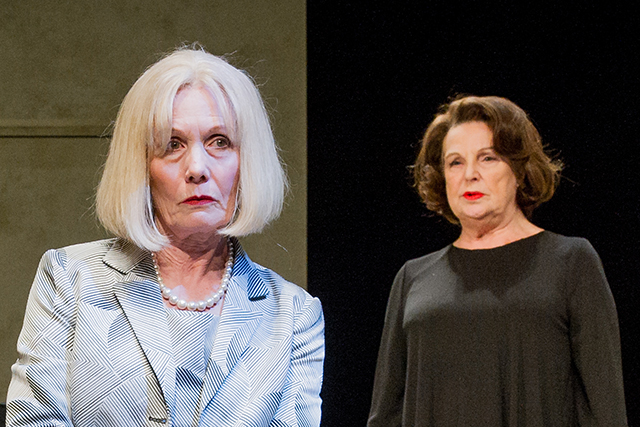
AYN: Why not? Because you don’t want to or because you can’t?
THERESA: I’m not answering.
(AYN waits)
THERESA: I’m not answering!
(AYN takes an amused look to GIDEON)
AYN: Gideon here is a capitalist.
THERESA: Well? So am I!
AYN: Gideon wants to build a capitalist society. That’s why he brought me here. Because of all the red-celled women in capitalist history, I am the fiercest, the feistiest.
THERESA: I can see that.
AYN: Don’t doubt it.
THERESA: I don’t.
AYN: Don’t even think of it.
(AYN stoops down to be directly opposite THERESA)
AYN: Look at me, Theresa, look me in the eye –
(THERESA levels with her, eye to eye)
AYN: It’s not just money that needs to pump freely round the system. It’s people. Give Gideon the people he needs. Give him the labour. So he can build a new society. A powerhouse society built by powerhouse people.
THERESA: I can’t.
AYN: Why not?
THERESA: You know why not.
AYN: Tell me.
THERESA: I can’t let them in. That way chaos lies. Also –
AYN: Yes?
(THERESA hesitates a moment)
THERESA: It’s more than my job’s worth.
GIDEON: Ah well now –
THERESA: All right-
GIDEON: Now we have it. Personal ambition!
THERESA: What, and you don’t have any?
GIDEON: “It’s more than my job’s worth!”
THERESA: So it is.
GIDEON: Now we get the truth. She keeps them out, Theresa keeps them out, not because it’s right but because it’s popular.
THERESA: It’s a democracy. You listen to the people. The people don’t want more people.
GIDEON: Too damn right. Because they want to rig the market. They want to keep the market to themselves.
(AYN suddenly moves away)
AYN: Let her out.
GIDEON: Sorry?
AYN: Let her out. Let her go. Her ears are closed.
GIDEON: Now?
AYN: Yes.
GIDEON: We haven’t finished.
(But AYN has already turned to THERESA)
AYN: I can’t persuade her.
GIDEON: Why not? It’s her duty to listen.
AYN: Gideon, there is no such thing as duty. Each man is alone in the temple of his spirit. Re-read my books.
THERESA: I thought you said you’d let me out.
(AYN shakes her head, regretful)
AYN: Theresa, you talk about ‘bad people’. What bad people? There are only weak people whose self-respect has been sapped by dependence on others. Put them in charge of their own lives and they too become good. I don’t ask you to take refugees out of altruism or lovingkindness. No, I tell you to take them in for your own sake. Your market can’t be free unless it’s open. Keep these people out and they’ll go away and make their own market and it’ll be better than yours, and it’ll be more competitive because the one thing they won’t do is throw walls up around it. No fencing, no barbed wire, no guntowers around their market. Tell you what, Theresa, Gideon’s lost the key in his trousers, but when he retrieves it, I’m going to open the door, and I’m going to let you walk out of here into the dark abyss of your own prejudice and stupidity. You walk. That’s your right.
GIDEON: I think I’ve found it.
(GIDEON has reached down and retrieved the key from his shoe. He holds it up)
AYN: Take your treasured place on the wrong side of history. If that’s what you want. One thing: you’ll never be short of company.
THERESA: Is that it?
AYN: That’s it.
THERESA: Finished?
AYN: Open the door.
(GIDEON unlocks and swings the door open. AYN and GIDEON stand on either side, waiting. THERESA hesitates)
THERESA: I must say, in an odd way, I’ve enjoyed meeting you.
AYN: Really?
THERESA: You’re an extraordinary woman.
AYN: I wish I could say the same for you.
THERESA: It’s been interesting hearing your views.
AYN: Again, I’d like to reciprocate. But I can’t.
(THERESA stops and looks AYN in the eye. Then she turns and goes out. GIDEON shuts the door and leans back against it)
GIDEON: An unsuccessful encounter.
AYN: Perhaps. For now.
(AYN looks at him a moment)
AYN: You know, Gideon, if you want to get anywhere in life you’re going to have be less angry.
GIDEON: Me? You think I’m angry?
AYN: You’re furious. Why? What do you want to be? Prime Minister?
GIDEON: Of course.
AYN: When?
GIDEON: As soon as convenient.
(AYN shrugs)
AYN: Freedom’s frightening. You’re stuck in a political party, chum, which doesn’t make sense. It says one thing and it does another. You live among stinking hypocrites. They want one thing only: to hold on to what they’ve got. History tells us they’ll lose. Leave it.
GIDEON: Leave what?
AYN: Leave the Conservative party.
GIDEON: Are you out of your mind? Leave the Conservative Party?
AYN: If you can change your name, you can change your party. Start a new one.
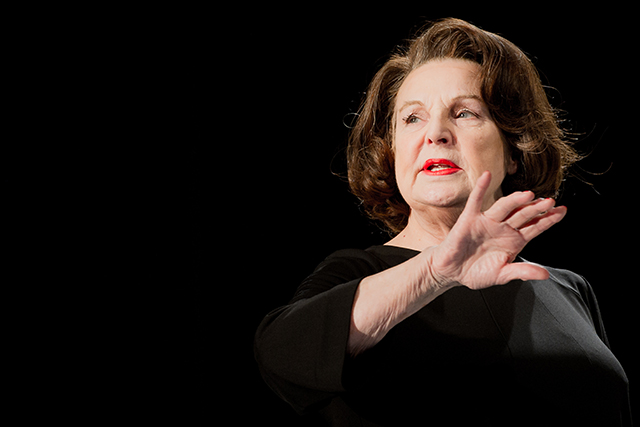
GIDEON: But I’ll lose power.
(AYN looks at him, full of amused contempt)
AYN: You’ll lose power?
GIDEON: Yes.
AYN: If that’s what worries you, then I can’t help you Gideon.
GIDEON: George.
AYN: Gideon.
GIDEON: George.
AYN: Gideon. Gideon.
(There is a silence)
GIDEON: Help me. Ayn.
END
AYN RAND TAKES A STAND © 2016 by David Hare. All rights whatsoever in this play are strictly reserved and application for performance etc. must be made to Casarotto Ramsay & Associates Limited, 7-12 Noel Street, London W1F 8GQ ([email protected]). No performance of the play may be given unless a licence has been obtained prior to rehearsal.
Now read…
Alistair Beaton: The Accidental Leader
Stella Feehily: How To Get Ahead In Politics
Enjoyed it? Donate to Out of Joint:



 Search
Search
